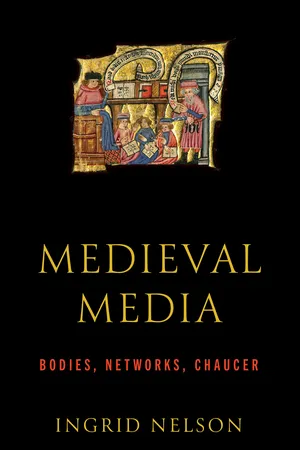
- 272 pages
- English
- ePUB (mobile friendly)
- Available on iOS & Android
About this book
Traces the development of media concepts across scientific, legal, and devotional knowledge domains to offer a coherent theory of premodern media
Were there media before the printing press? Although medieval culture lacked the machine technologies that we conventionally associate with the idea of media, medieval thinkers developed extensive scientific, legal, and devotional discourses of media and mediation. Ingrid Nelson draws on contemporary media theory to explain how premodern media—including not only easily recognizable media forms like books and paintings but also bodies and environmental elements that mediate perception—served as essential materials of communication between self and world.
Tracing the development of medieval media from the rediscovery of Aristotle's work on sense perception to post–Magna Carta legal forms and Christian devotional practice, Medieval Media synthesizes these diffuse discourses to present a coherent theory of premodern media. Turning her focus to literature, Nelson shows how Geoffrey Chaucer's The Canterbury Tales draws on medieval media theory to express an aesthetic materialism that emphasizes relation and network over mimesis and representation. In exploring how literature shapes and is shaped by medieval media, The Canterbury Tales articulates a poetics of media that seeks to unite the perceptual, social, and spiritual capacities of human experience, even as it encodes emerging exclusions and restrictions of bodies marked by race and gender in medieval Western culture.
Bringing medieval studies and media studies into conversation with one another, Medieval Media uncovers concepts and theories of premodern media that expand our understanding of media history and open new avenues for medieval literary studies.
Frequently asked questions
- Essential is ideal for learners and professionals who enjoy exploring a wide range of subjects. Access the Essential Library with 800,000+ trusted titles and best-sellers across business, personal growth, and the humanities. Includes unlimited reading time and Standard Read Aloud voice.
- Complete: Perfect for advanced learners and researchers needing full, unrestricted access. Unlock 1.4M+ books across hundreds of subjects, including academic and specialized titles. The Complete Plan also includes advanced features like Premium Read Aloud and Research Assistant.
Please note we cannot support devices running on iOS 13 and Android 7 or earlier. Learn more about using the app.
Information
Table of contents
- Cover
- Series Page
- Title Page
- Copyright
- Dedication
- Contents
- Introduction. Understanding Premodern Media
- Part I. Saeculum
- Part II. Technê
- Part III. Spiritus
- Notes
- Bibliography
- Index
- Acknowledgments